Research Round-up – November 2020
Welcome to the latest instalment of our monthly feature series throwing the spotlight on our research success stories.
The strength of our research is in making a real and telling difference to the world around us, by working across traditional boundaries to find innovative solutions to some of the greatest challenges facing society today.
Here we highlight some of latest projects being pioneered by the expertise and efforts of the highly talented research community at Leeds.
From grant awards to examples of outstanding interdisciplinary work and best practice, we’re keen to showcase your research achievements. See the foot of this article for details of how you can get involved.
Featured in this month's round-up:
- New report showcases civic links
- Linking academics with policymakers
- Prestigious Fellowship award for leading academic
- Space research aims to boost Yorkshire economy
- Powering the next generation of rail travel
- Responsible metrics for research assessment
- Past is key to predicting future climate
- Circular economy to drive UK sustainability
- Transforming infrastructure to reach net-zero
- Cancers detected early thanks to pioneering trial
- Pre-surgery chemotherapy benefits to be explored
- Understanding the way proteins shapeshift
- Call to apply for White Rose Collaboration Fund
- How to feature in future research round ups

The power of University research in supporting the vital work of Leeds City Council has been highlighted in a new report
New report showcases civic links
Academics at Leeds Social Sciences Institute undertook a review of research collaborations between the University and the city council to understand how the two institutions might work even more closely.
The two institutions have a long history of working together for the good of the city and its citizens. From addressing the challenges of climate change to driving innovation in healthcare, academics and council workers have worked together across many projects to ensure our world-class research is used for the benefit of local communities.
The new report - Unlocking the Potential of Civic Collaboration – surveyed both University and council employees on the breadth and depth of existing partnerships, plus the benefits of collaboration. It also asked them to identify factors that help or hinder successful collaboration between them.
Vice-Chancellor, Professor Simone Buitendijk, said: "Our research community is driven by the desire to make the world a better place, and by working with Leeds City Council, we can apply our world-renowned research to inform policies that make a real difference to the lives of people right here in Leeds.”
Work is now ongoing to implement the report’s recommendations. This includes the call for a joint research-policy collaboration strategy, which would see both institutions commit to working together on shared priorities, including covid-19 recovery, climate change, transport, inclusive growth and more.

Policy Leeds will ensure the world-class research undertaken in Leeds is accessible to policymakers
Linking academics with policymakers
A new policy institute has been launched at Leeds aimed at strengthening the ties between our world-renowned research community and policymakers across the globe.
Policy Leeds is a dedicated hub that brings together academics and policy actors – such as politicians, civil servants, think-tanks and inter-governmental organisations – to ensure research undertaken at Leeds has a real-world impact and can help solve policy challenges.
Within the University, Policy Leeds will work with research support, professional development, engagement and communications staff to ensure established and emerging researchers can successfully collaborate with decision-makers in the UK Government, Parliament and beyond.
Professor Nick Plant, Deputy Vice-Chancellor: Research and Innovation, said: “Whether it’s advising Downing Street on the impact of coronavirus or informing international action on climate change, researchers at Leeds are already having a big impact and working with governments to solve the global challenges we face.”
Policy Leeds is being led by Professor Andy Gouldson, an interdisciplinary social scientist who specialises in engaged, impact-orientated research on climate change. Throughout his career, he has worked closely with policymakers and regulatory and development agencies at international, national and local levels.
He said: “Policy Leeds will be charged with promoting the benefits of working with governments to our research community – and act as a brokerage for decision-makers who want to harness the University’s expertise.”
Find out more about the launch of Policy Leeds
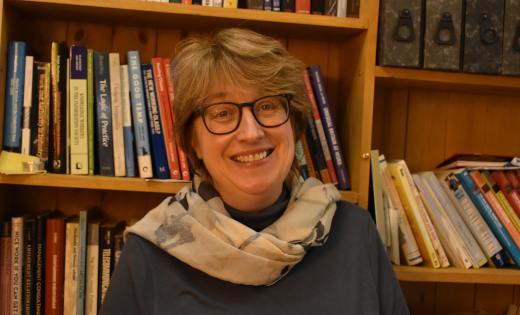
Professor Irena Grugulis has been elected a Fellow of the Academy of Social Sciences
Prestigious Fellowship award for leading academic
One of the leading figures at Leeds University Business School (LUBS) has been made a Fellow of the Academy of Social Sciences.
Professor Irena Grugulis, Chair in Work and Skills, has been recognised for outstanding contributions to research and leadership.
As a specialist in qualitative research, Professor Grugulis focuses on learning and skills at work, including the ways that work both supports and limits learning, the challenges raised by soft skills and the links between skills and performance.
She said: “I am delighted and honoured to be elected to such a prestigious Fellowship. I hope it will spur me to continue to research and continue to improve my own practice.”
Besides her research, Professor Grugulis has also written two textbooks and published studies about learning and work in a range of settings, including the creative industries (film, TV and computer games), the retail sector and the Fire and Rescue Service.
Vice-Chancellor, Professor Simone Buitendijk, said: “This is important recognition of Professor Grugulis’ hard work and dedication, which I am sure will be applauded by the whole University community.”
The Academy of Social Sciences also congratulated those joining the Fellowship for applying their knowledge and expertise across diverse areas of public life and working to improve social, political and economic wellbeing – both in the UK and beyond.

Space has transformed into one of the UK’s fastest sectors during the past decade
Space research aims to boost Yorkshire economy
Leeds is to help spearhead a national programme of technological revolution backed by the UK Space Agency.
World-leading research in climate change, space and planetary science, navigation and transport, advanced computer techniques and instrumentation design is already carried out at Leeds.
Academics are working on global issues ranging from air quality, weather forecasting and sea level impact to flood alerts, earthquakes and polar glaciers.
Now, that expertise will underpin an ambitious programme that aims to bring together development and investment in new digital and space-related technology approaches.
The project will see the University, Leeds City Region Local Enterprise Partnership (LEP) and other partners work together to further develop an emerging Local Space Hub across West Yorkshire, including Bradford, Calderdale, Kirklees, Leeds and Wakefield.
The UK space industry now employs close to 42,000 people nationally and generates income of nearly £15 billion per year.
Professor Nick Plant, Deputy Vice-Chancellor: Research and Innovation, said: “Challenge-led innovation sits at the heart of national and international research networks.
“The UK has world-leading expertise in the space sector, and the University is proud to be supporting entrepreneurship in the North, through the development of a regional space hub here in the Leeds City Region.”
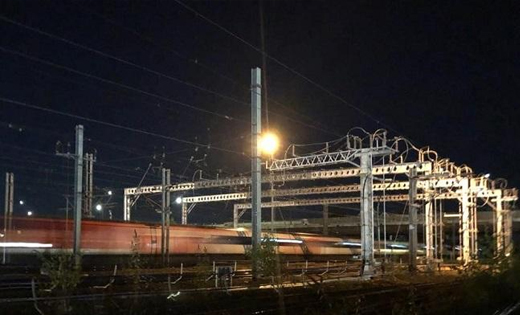
The East Coast Main Line is to undergo a £1.2 billion upgrade
Powering the next generation of rail travel
An outline £10 million co-investment agreement has been signed by the Leeds and the companies involved in the power supply upgrade of the East Coast Main Line.
The new partnership will enable a two-year research into the best and most efficient way of managing the electrical power flow onto the route, which is expected to get busier with newer and faster electric trains, including high-speed trains.
The East Coast Main Line is a strategic rail link between London, Yorkshire and Scotland and carries more than 20 million passengers a year. New track and signals are being installed, along with an upgraded electrical power system, as part of the £1.2 billion East Coast Upgrade.
This is the biggest investment in the route in a generation, which will make way for more services to meet passenger demand and bring a more reliable railway.
The power upgrade involves new sub-stations plus 1,600 km of cabling and overhead line equipment. When completed, the work will result in the introduction of more electric trains, which are quieter and more environmentally friendly.
Leeds is developing one of the most advanced rail research institutes in the world. The Institute for High Speed Rail and System Integration has a focus on investigating how different rail systems work together.
The Institute will be built on a site next to the Leeds City Region Enterprise Zone on the south eastern edge of the city and forms the early phase of a wider plan to position the Leeds City Region as a UK centre for rail engineering, which will generate jobs and inward investment.
Responsible metrics for research assessment
Our statement in support of Responsible Metrics in the Assessment of Research is now available on the Research and Innovation Service website.
Leeds recognises the value of all research outputs and contributions to research from across the disciplines and career stages.
The statement sets out our commitment to the use of peer review and expert judgement.
It also points out the measures and principles we strongly endorse regarding qualitative evaluation, data collection, performance measurement and more.
The statement also reaffirms our commitment to the San Francisco Declaration on Research Assessment (DORA).
As a signatory, we support DORA’s encouragement for considering all forms of research outputs in the assessment of any research project.
We also support the view that the primary value of any research lies in the knowledge it generates – not the publication metrics or the identity of the journal in which it is published.
Guidance to help colleagues get a greater understanding of what the contents of this statement will mean in practice will be made available soon.
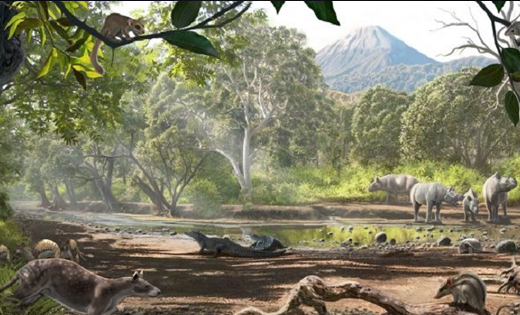
The most recent warm climate offering a glimpse into the future occurred about 50 million years ago
Past is key to predicting future climate
Including paleoclimate data in the development of climate models could help scientists predict scenarios for future climate and propose strategies for mitigation, according to a new study.
An international team of climate scientists, including Dr Benjamin Mills from Leeds, suggests that numerical models predicting future climate change should include simulations of past climates in their evaluation and statement of their model performance.
The study highlights that as more and better information becomes available about Earth’s distant climate history, this insight becomes increasingly relevant for improving understanding of how key elements of the climate system are affected by high greenhouse gas levels.
Unlike historic climate records, which typically only go back a century or two – a mere blink of an eye in the planet’s climate history – paleoclimate data stretches back many millions of years before humans existed.
Study co-author, Dr Mills, is from the School of Earth and Environment and part of the internationally respected Palaeo@Leeds and Cohen Geochemistry groups. Their work includes Earth system modelling and compiling the geological datasets to which climate models are compared.
Dr Mills said: “The Earth is no stranger to high CO2 levels and warm climate, and these warmer conditions have in fact persisted for most of the time since animals evolved. It is the speed of the transition, which is so concerning today – rapid warming episodes in Earth’s past are linked to mass extinction.”
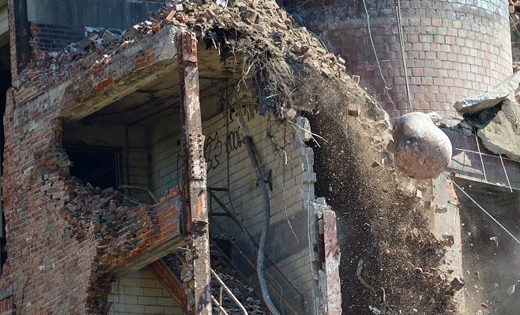
Our researchers will help embed the principles of the circular economy across the industrial sectors
Circular economy to drive UK sustainability
Leeds has secured funding to help two large industrial sectors – textiles and construction – in making the transition to a greener, more sustainable future where they reduce waste, energy and pollution.
The Government believes it will result in businesses using fewer resources and having less impact on the environment. They also want it to spark innovation in product and material design and create jobs.
Researchers at Leeds will help embed the principles of the circular economy across the industrial sectors. That involves a shift away from a linear business model of raw materials being extracted, processed and then discarded – to one where materials are designed to be reused.
The Government hopes the initiative will reduce the amount of minerals extracted by the UK construction sector every day by half-a-million tonnes – and the generation of 154 million tonnes of mineral waste each year.
A group of universities, including Leeds, has received £4.5 million from UK Research and Innovation (UKRI) to establish and operate the research centre, known as the Interdisciplinary Circular Economy Centre for Minerals-Based Construction Materials.
In total, the Government announced five centres to drive circularity across the UK economy and Leeds is involved with two.

Infrastructure systems play a crucial role in delivering societal wellbeing
Transforming infrastructure to reach net-zero
Leeds researchers are developing a new long-term planning approach for changing infrastructure that can meet the growing social and environmental challenges facing cities.
Led by Dr Katy Roelich, from the Priestley International Centre for Climate, our researchers are developing a new approach to decision-making that brings together a range of actors, whilst focusing on wellbeing outcomes and long-term planning.
The Multi Actor Adaptive Decision Making (MAADM) project is using regional transport planning in Greater Manchester as a case study to develop these approaches. The project uses participatory techniques to ensure the approach and models they design can cope with real-world scenarios and meet the needs of decision-makers.
The way we move within and between cities needs to change dramatically if the UK wants to meet its net-zero ambitions. A new systemic approach is necessary to address the linkages between transport, the economy and wellbeing, whilst accounting for increases in complexity, uncertainty and the number of organisations involved in transformation. Leeds researchers are working with Transport for Greater Manchester to embed multi-actor adaptive decision-making throughout their strategic and delivery processes.
Dr Roelich said: “Many UK cities are failing to meet the wellbeing needs of all of their citizens and their ambitious climate commitments. Transforming infrastructure is vital to solving both of these issues.”
Discover more about the project
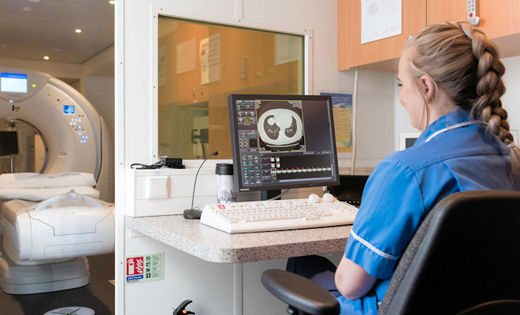
Lung cancer is the most common cancer in Yorkshire
Cancers detected early thanks to pioneering trial
A lung cancer trial aiming to detect disease in higher-risk patients before they show symptoms has caught dozens of cases early.
More than 100 lung cancers have been detected by the Leeds Lung Health Check, which has screened 5,600 people since its launch in November 2018.
Lung cancer – the most common cancer in Yorkshire – is frequently diagnosed at a late stage when treatment options are more limited and survival rates are lower.
But thanks to the screening, patients diagnosed at an early stage went on to receive surgery and curative radiotherapy.
The multimillion-pound trial is a partnership between the University, Leeds Teaching Hospitals NHS Trust and Leeds City Council, and is funded by Yorkshire Cancer Research.
It aims to test screening in community settings and provide information to improve the effectiveness and benefit of future lung-screening programmes.
Professor Mat Callister, from Leeds Teaching Hospitals NHS Trust, said: “The Leeds Lung Health Check was the first of the lung health check services in the country to get restarted.
“We altered the process on the unit to keep people safe and allow the team to continue this really important work. It’s vital that people attend their appointments for these life-saving scans.”

The trial is one of three to be awarded funding
Pre-surgery chemotherapy benefits to be explored
Benefits of giving chemotherapy before surgery to bowel cancer patients will be further explored in a new £3.4 million trial – one of three awarded regional funding.
Patients are usually treated with surgery first and may go on to have chemotherapy to help stop the cancer coming back.
However, a previous international trial has shown that giving six weeks of chemotherapy before an operation can lead to better surgery, reduce complications and improve survival rates.
Led by Dr Jenny Seligmann at Leeds and Professor Dion Morton at the University of Birmingham, the new trial will test whether more extensive chemotherapy can further improve benefits in fit patients. It will also test different ways of treating older and frail patients with chemotherapy ahead of surgery.
Dr Seligmann, Consultant Medical Oncologist in the School of Medicine, said: “The new trial will save lives and improve the experience of patients in Yorkshire.
“As well as providing an opportunity to take part in research, which is known to improve survival rates, the trial will help bring gold-standard treatment to participating hospitals.”
The trial is one of three to be awarded funding by Yorkshire Cancer Research.
Understanding the way proteins shapeshift
Leeds researchers secured a £5.4 million grant to identify new techniques for investigating and manipulating the chemical building blocks of life – proteins.
The five-year project – in collaboration with the University of Oxford – will lead to a better understanding of fundamental biochemical processes and will identify new research strategies for tackling cancer and other diseases.
Andy Wilson, Professor of Organic Chemistry in the School of Chemistry at Leeds and principal investigator, said: “The goal of this project is not only to get a better understanding of the way proteins work, but to establish how to disarm the ‘rogue’ behaviour of some proteins that lead to disease.”
Proteins are the chemical workhorses that give cells their shape, structure and function. They are large molecules that can perform a range of cellular operations.
The academic scientists will work closely with industrial partners AstraZeneca and LifeArc to ensure rapid translation of research findings into drug discovery.

Researchers are invited to apply to the latest round of a highly successful funding scheme
Call to apply for White Rose Collaboration Fund
Researchers are invited to apply to the latest round of a highly successful funding scheme.
Operated by the White Rose University Consortium (WRUC), the Collaboration Fund aims to support and encourage emerging partnerships across the Universities of Leeds, Sheffield and York – in particular, to support projects that have the potential to lead to larger, more strategic initiatives.
Applications for up to £15,000 per project are encouraged in areas where there are no existing collaborations between the universities. However, this does not exclude existing areas of collaboration where support might lead to enhanced activity and significant funding opportunities.
Many Leeds colleagues have won grants to lead projects with partners from York and Sheffield. Recent examples include:
Refugia of Futures Past – research into the baseline conditions and distribution of future Earth human refugia, which the detailed palaeoclimate evidence can inform, led by Dr Christopher Lyon (School of Earth and Environment)
Oral Health White Rose Consortium (OH-WRC) – a collaboration to provide exposure to oral health research in the Batley community – a region of high social deprivation, oral and health inequality and ethnic diversity – co-led by academics from the School of Dentistry, Dr Julia Csikar and Dr Karen Vinall-Collier.
Find out how to apply for the Collaboration Fund
How to feature in future research round ups
Please contact Internal Communications if you or one of your colleagues would like to appear in this monthly feature.
Posted in: University news